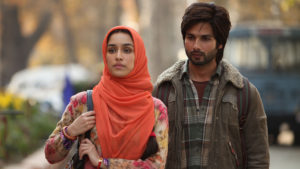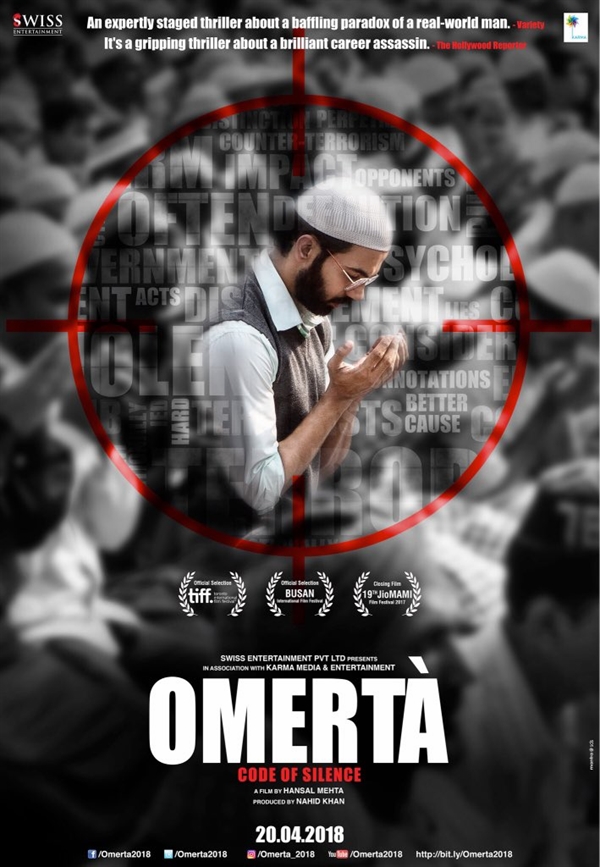
Bollywood Redux Film Review “Haider”
WATCH THE TRAILER HERE
First, the Recap:
Alas, shall our circumstances dictate the seeking of retribution and justice? When we have been wronged but the proof of said offenses needs revealed, shall we pursue it to whatever extremes are necessary to do so? Does it all equal an ending that sees healing? Will it rather only find a journey to dire consequences? In the conflict-ravaged country of Kashmir, Haider (Shahid Kapoor) returns home from Aligarh to find his beloved father Hilal (Narendra Jha) missing, his now wayward mother Ghazala (Tabu) in the company of and, it seems, at the whim and comfort of his potentially treacherous uncle Khurram (Kay Kay Menon), and his great love Arshia (Shraddha Kapoor) wanting to rekindle what they once had since childhood. The more Haider digs into his father’s disappearance, the uglier truths get revealed, causing Haider’s grip on sanity to fray and his quest for answers and necessary vengeance to overtake all he is, with the cost of it all to be unveiled.
Next, my Mind:
This critic mentioned in an earlier review for “Maqbool” that it takes the knowledge, skillfulness, intelligence, and boldness of a veteran filmmaker to take what the world considers (very rightly so, mind you) an exemplary literary achievement, maintain its core structure, but then bring it into a contemporary age in a manner that’s feasible as well as captivating. This was definitively the case with this second effort from the esteemed Vishal Bhardwaj that I had the opportunity to re-discover and take in, which once more illustrated the multi-faceted artistry he delivers to the screen while still not allowing even lush, arresting visuals to overshadow the deeper character-driven focus and dramatically impactful story being presented in this modern version of a true epic from written history. This a unique take that U.S. audiences should take the time to watch and appreciate, as it is so deftly representative of the magnitude of consummate filmmaking ability the South Asian sector musters and conveys.
The glitz and so often entertaining degrees of “just-gotta-move-your-body” song and dance sequences associated with mainstream Bollywood cinema takes a hard left turn, steering completely away from this format and plunging us with wholehearted intent into depths of exceptionally acute, vigorously impassioned, unshakably potent, sometimes jarringly unsettling dramatic realms via this 180-minute epic feature film from writer/director/producer/composer Bhardwaj, writer Basharat Peer, producer Siddharth Roy Kapur, and co-producers Rekha Bhardwaj, Amrita Pandey, and Sandeep Sharma. Given the ultimate source material for this narrative, which is another classic from “The Bard” himself, William Shakespeare, and his tale of “Hamlet”, it’s no wonder this project propels us so deftly into a world of betrayal, revenge, love, family, and madness.
Another story that has seen screen time over the years in multiple ways, this interpretation focuses on real historical events as a backdrop and turns the titular title character and makes him a now-adult student returning to his homeland of strife-ridden Kashmir to find that his own house, much less any others, is decidedly NOT the way he remembers, with additional, enigmatic, and eerily harrowing circumstances plaguing his mind about his father being “disappeared” and his mother and uncle becoming seemingly much more than friends. On top of this, his childhood sweetheart is desiring to win him back as well. However, as with the fabled tale, the film slowly but with awesomely designed and very effectively executed determination and purpose illustrates a decent into frustration, anger, resentment, and quest for justice that consumes our protagonist to both agonizing yet undeniably affecting, stirring, and emotionally charged decisions that soon have him immersed in militant actions to uncover the truths no one else will dare to find–all while becoming a tad unhinged in the process.
It all leads up to an explosive (in several ways, mind you) and formidable finale that really does put an evocative and forceful exclamation point on events, which for any of us who know the journey of “Hamlet” would expect, as this IS a tragedy after all. It is, of course, all set up at the film’s initial starting point where the background of what’s occurred up to the point of Haider’s return is delivered, and this maintains the context of everything we are then witness to. As with so much of Shakespeare’s works, the narrative is replete with thematic wealth, showcasing previously hinted at above tangents factoring in love, hate, rage, insanity, sorrow, forgiveness, the burning drive of enmity, a desire for freedom from perceived or proven tyranny and hostility, personal and national suffering, the falling to spiraling violence, political maneuvering and corruption, plus even some dark (but wholly feasible in its placement) humor, and YES, there IS a song and dance sequence here, but it is assuredly a less than happy-go-lucky situation warranting it, shall we say.
I have been a huge fan of Shadid Kapoor ever since my first experience seeing the actor through a stunning performance in the EPIC 2016 effort “Udta Punjab“, then subsequently in 2017’s “Rangoon” and 2018’s “Padmaavat”. Here, he very much channels what would become the fiery intensity he’s known for in those films into this role as Haider, a young man who simply wishes to come home to Kashmir and renew his life there. But, when arriving there proves to reveal deep loss, possible treachery, a broken family, and the horrors of a country under attack thrusts him headlong into a world of injustice, death, the need for answers, and what he sees as the brutally clear path to right things. Even with the one spot of hope via his childhood love attempting to take him away from this choice, it cannot stop his regression into frenzied mayhem, and watching how Kapoor navigates this interpretation of The Bard’s classic character through a transformation from innocent, peaceful man to turbulently unstable yet hauntingly calculating tool of vengeance is just spectacular to witness thanks to his dominant performance.
Never to consider her being outdone or outshone by any means, the always stunning Tabu makes her presence known in the second Shakespeare-based effort this critic has seen her in (the other–“Maqbool”), this time as Haider’s emotionally compromised and off-kilter mother Ghazala, a woman reeling from her husband’s disappearance and apparently swept up in her need for comfort by Haider’s uncle, Khurram. But, when we think sympathy might be on her side, others realities are uncovered that tell otherwise, causing their own catalyst of chaos for Haider and anyone around her. It’s a powerful and strong turn, and Tabu is simply amazing. Likewise, Menon provides us that true “love-to-hate” villain via his role as Khurram, whose involvement with Haider’s father’s disappearance and the consequent taking in of his wife is the stuff of utter unscrupulousness and vileness, and how he continues to attempt to manipulate the whole hunt Haider is doing for the facts is equally unnerving, with Menon the entire time so beautifully believable.
Shraddha Kapoor provides a source (maybe the ONLY true one we see!) of light and glimmer of hope in the vastness of such dire state of affairs thanks to her turn as Arshia, Haider’s long-time love and who is only seeking to make more of herself as a journalistic professional-to-be while enjoying the thoughts of reuniting with her adoration for Haider. But, as she begins to lose him to his firmly based but destructively consuming ire, it may dictate her future and fate more than she realizes, and Kapoor paints a beautiful, painfully heartbreaking portrait of such honorable, faultless love tarnished by malice’s vicious grasp. Excellently acted, primary supporting roles abound here, beginning with Narendra Jha as Haider’s father Dr. Hilal Meer, who gets unceremoniously targeted by the occupying Indian Army in Kashmir for treating both sides and an opposition leader and is taken away, soon becoming one of “the disappeared”, which sparks Haider’s crusade to find out what actually happened to him.
Kulbhushan Kharbanda is Hussain Meer, Ghazala’s father-in-law, Lalit Parimoo is Pervez Lone, the local police chief, Ashish Vidyarthi as Brigadier General T.S. Murthy of the Indian Army who tries to put forth a “good face” to the occupying force he commands in Kashmir, Aamir Bashir is Liyaqat, Arshia’s brother who’s none to happy about Haider on multiple levels that could lead to fatal results, Sumit Kaul and Rajat Bhagat as “The Salmans”, supposed friends of Haider’s who may or may not be totally duplicitous in their agenda and attitude towards him, plus the indomitable Irrfan Khan (whom we so tragically lost in 2020) as Roohdaar, a mysterious yet powerful presence who gains access to Haider through Arshia and becomes a voice of “reason” to him and the history of what happened to his father. So, in total, “Haider” is a fantastically realized, fiercely significant, even awareness-raising adaptation of a classic that resonates with you long after the credits role thanks to its unflinchingly candid take on the tale it’s modeled after and the incredible performances that bring it to vivid, troubling, but fully engaging life.
As always, this is all for your consideration and comment. Until next time, thank you for reading!






